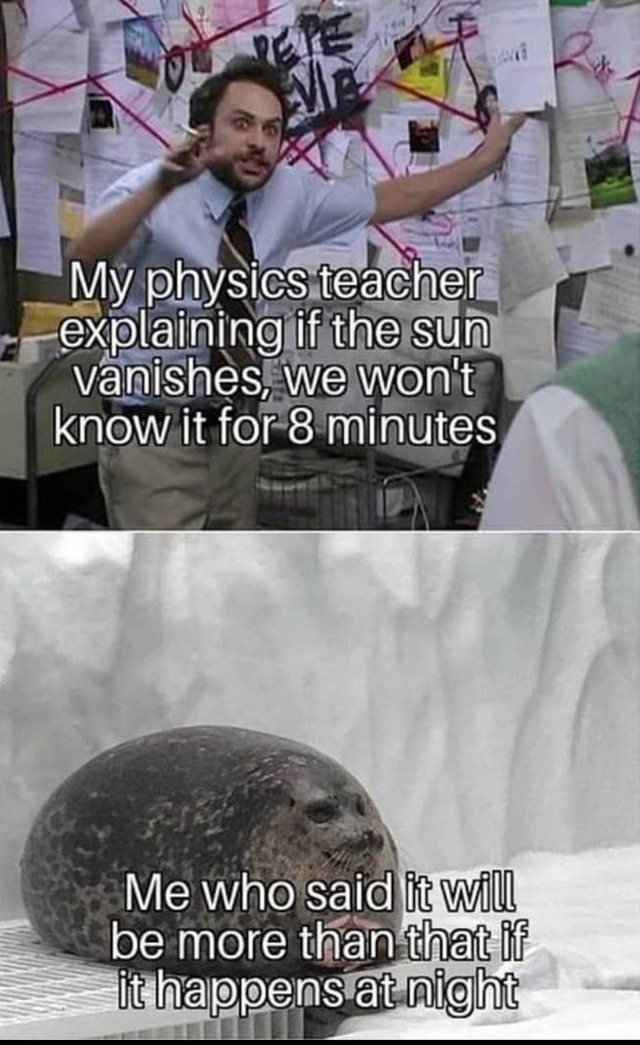Wouldn't you see the effect on the moon?
Science Memes
Welcome to c/science_memes @ Mander.xyz!
A place for majestic STEMLORD peacocking, as well as memes about the realities of working in a lab.

Rules
- Don't throw mud. Behave like an intellectual and remember the human.
- Keep it rooted (on topic).
- No spam.
- Infographics welcome, get schooled.
Research Committee
Other Mander Communities
Science and Research
Biology and Life Sciences
- [email protected]
- [email protected]
- [email protected]
- [email protected]
- [email protected]
- [email protected]
- [email protected]
- [email protected]
- [email protected]
- [email protected]
- [email protected]
- [email protected]
- [email protected]
- [email protected]
- [email protected]
- [email protected]
- [email protected]
- [email protected]
- [email protected]
- [email protected]
- [email protected]
- [email protected]
- [email protected]
- [email protected]
- !reptiles and [email protected]
Physical Sciences
- [email protected]
- [email protected]
- [email protected]
- [email protected]
- [email protected]
- [email protected]
- [email protected]
- [email protected]
- [email protected]
Humanities and Social Sciences
Practical and Applied Sciences
- !exercise-and [email protected]
- [email protected]
- !self [email protected]
- [email protected]
- [email protected]
- [email protected]
Memes
Miscellaneous
Only if the moon is up.
Moon is a fake bitch.

Imagine seeing the moon just switch off
That would be a beautiful, terrifying sight. You could gaze up at the most amazing view of the stars as the whole world froze to death.
If you can see the moon (if it is "up" at night).
Yup
If I understand that right, gravity also moves in space at the speed of light, therefore Earth will keep on orbiting for 8min around nothing?
Kind of. The concept of simultaneity breaks down at distances where the speed of light matters. If we base it on what we currently observe and call "now" on the Sun the eight minute old state we currently observe then what does "now" on earth look like from the point of view of the Sun at that same moment? You can't reconcile a single "now" for observers in both locations.
An alternative take which is also consistent with observable physics is that the speed of light is infinite but it's causality itself that propagates at c.
Thinking in those terms also makes a number of relativistic effects more intuitive. You need infinite energy to reach the speed of light simply because it's infinitely fast. Time dilates when moving because you're encountering approaching causality earlier than you otherwise would have. Time "stops" for anything traveling at the speed of light because at infinite speed it just experiences literally everything in its line of travel at once and the concept of "after" becomes meaningless, encountering all future oncoming causality in a single instant.
This was a bit of a tangent but it's something that has fascinated me for a long time.
I'm trying to understand how that reference frame works when you just just bounce a photon off a mirror and time how long it takes to come back? Like, light must have a non-infinite speed to the stationary observer, or it wouldn't take time to traverse the distance.
thats the thing, thats from your reference frame. From the photons perspective time stands still and everything happens at once
It's sort of how if you hold a slinky on one end hanging down, then drop the slinky, bottom will not start falling until the top reaches it. In a sense, bottom will be hanging onto nothing. But of course that nothing is tension from the top of the slinky.
That was an intuitive way to think about it, thank you.
That is correct as weird as it sounds
The sun could be gone but its influence would remain. Kinda like getting out of a pool and looking back to see the waves on the surface that you caused.
It goes to 9 minutes from 8, since every single communication gadget will yell out that the sun has disappeared as reports come in from the other side of the earth.
Depending on the lunar cycle, the night time side would notice the moon become dim.
~~dim~~
Disappear
Ok yeah you’d definitely want any story to have the sun disappear take place at night, with a full moon, possibly a large harvest moon for ambiance. The moon disappears and within minutes you’re bombarded with calls…
That is actually correct. The difference of being on the opposite side that faces the sun is just a few thousandths of a second, but it is there.
Now I am curious, somebody explain. if it just stopped burning, would we know after 8 mins, if we lived on the opposite side?
Moon would "disappear" when it no longer reflected Sun's light.
It would also start getting very cold fast
It would probably take more than a day for the cold to be so intense that you can't possibly explain with some normal local phenomenon.
The moon might be on the daylight side, so we wouldn't necessarily observe that.
Any visible planet or asteroid would. So some stars would also appear to blink out, but those would take longer to blink out. So the moon would go after 8 minutes, Jupiter would take 43 minutes to stop receiving light, and another 35-52 minutes to disappear for earth depending on orbital locations.
Presumably we would get something on radio/tv/internet from the side facing the sun once they realized it, that of course being only if they hadn't already been eradicated by a horrific shockwave caused by whatever event caused the sun to vanish before they had a chance to report what they saw, because supernovae tend to travel at very close to the speed of light, so there wouldn't be much time for them to react.
And if this is a supernova, you might just have time to grok what happened before the planet was obliterated under your feet from the shockwave.
So I guess... chances are we would just barely understand what happened before we were gone.
Does heat travel at the speed of light? I just realized I have no idea how the heat from the sun travels to earth.
The "heat" IS the radiation. So, yes.
Someone correct me if I'm missing some nuance here, but heat doesn't get transferred directly through space because heat is vibrating molecules and space is a vacuum. The sun radiates (speed O' light). A lot of that radiation just reflects off the earth (or we wouldn't be able to see it), but a lot of it gets absorbed. THAT's when it's converted into heat energy. It's also why the greenhouse effect is a global phenomena: light energy comes in across the vacuum relatively easily, turns to heat on Earth instead of being reflected, heat energy cannot escape as easily as light energy.
When there is a total solar eclipse, the temperature does drop dramatically. But it might not be detectable on the other side right away for sure.
I wonder how cold how fast.
It wouldn’t really be faster than normal nighttime cooling. However, that cooling would continue instead of having the sun to start warming stuff up in the morning.
It takes 8 minutes for the light to travel from the sun to Earth. Because light in a vacuum travels faster than anything, including information, we would not and could not know it had disappeared for 8 minutes. This means Earth would continue to follow its orbit around a non-existent sun for 8 minutes because the Sun’s gravity would still be acting on the Earth.
If it was nighttime, you wouldn’t notice the sudden lack of sunlight (other than if it was a full moon) but you’d almost certainly notice the change in gravity.
Edit: actually, you wouldn’t feel any difference in gravity or experience any change of acceleration. What you would experience is a very tiny vibration, of 1 million push notifications being sent to your phone from the other side of the planet.
Interesting, so you are saying light is faster than gravity?
light speed = gravity speed
I don't think you'd actually "notice" the gravity.
Earth would still retain it's mass, and we're much closer to it, so it's lesser mass acts much more on us than the sun's greater.
Though, the earth would stop orbiting the sun and ~~travel on a mostly tangential path~~ travel nearly radially away from where the sun was, instead of the elliptical path it currently travels.
This is a very interesting physics question that I may look into further. Specifically what would the theoretical acceleration be, due to the lack of the sun? Is it above a humans level of perception?
Yes, because of the medium of communication you are using right now.
I'm more interested in how long before we freeze to death.
How long will the earth's atmosphere hold onto its heat?
I'm more interested in how long before we freeze to death.
Kurzegesagt did a great video on this thought experiment: https://www.youtube.com/watch?v=gLZJlf5rHVs&t=1
The classic sci-fi short story A Pail of Air touches on this.
The moon would disappear though, so you'd notice by looking at the sky if it wasn't obstructed by clouds.
If the sun disappears when? According to GR's conception of simultaneous events, it disappears immediately.
Which two event are you talking about being simultaneous? The Sun going out and Earthers observing it? Those things will not be simultaneous in any reference frame, because they are "light-like" separated. (ie they lie on a 45 degree line in a Minkowski plot.)
Technically true since the daytime side will know first.
Well they're not entirely wrong... I mean I turn off my notifications when I go to sleep.
